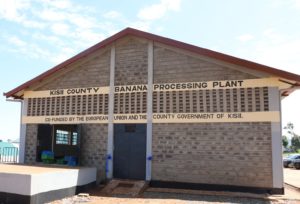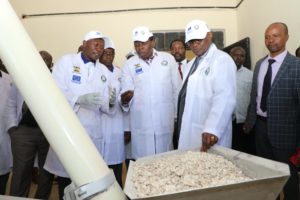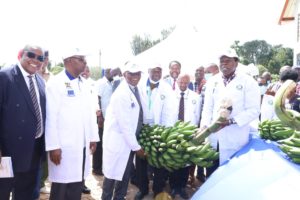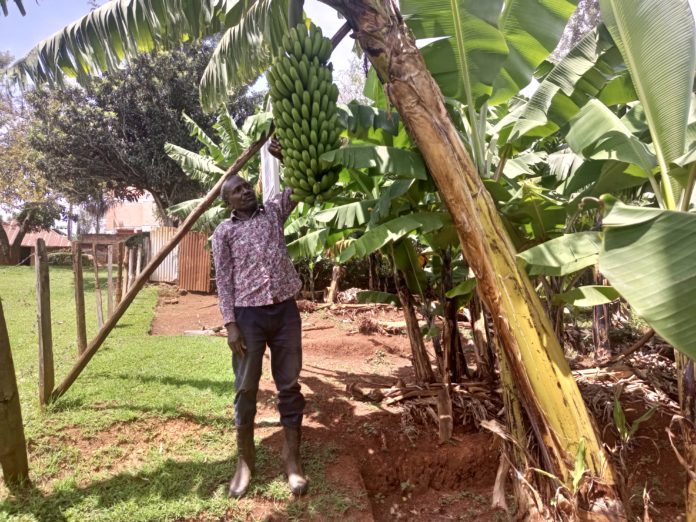By Elizabeth Angira, DevReporter, Kisii County

Mr Fred Omoke, a retired public servant, ventured into banana farming in Kisii County about 15 years ago to supplement his family’s nutrition and diversify his sources of livelihood. But the project that initially looked promising was frustrated by middlemen in the banana value chain, pushing him to sell directly to customers.
“With the help of my beloved wife Grace Nyanchama, I decided to sell my bananas directly to my customers because I realised that middlemen were taking advantage of us to buy our bananas for a song,” he says.
Selling bananas directly to customers, though tedious and sometimes leading to losing some of the produce because of delays or failure to secure buyers, Mr Omoke explains that he has been able to sell a bunch of banana at between Ksh 500 and 700. “If I went through brokers, I would be getting half of the price,” he says.
Banana Factory
The Kisii County Government in conjunction with the Kenya National Government and the European Union (EU) has invested in a banana-processing factory in Kisii County, built on land belonging to Kisii Agriculture Training Centre. The factory will serve Kisii, Nyamira, Migori, Homa Bay, Transmara and Bomet counties and their environs. The processing factory is going to produce banana flour and banana wine.
The factory now gives hope to many small-scale banana farmers in the county who have suffered due to lack of access to markets, leading to post-harvest losses. Bananas are highly perishable and unscrupulous middlemen have taken advantage to extort farmers.
The EU granted the County Ksh 110 million for the project with the County Government contributing Ksh 60 million to establish the factory.

According to Kenya Agricultural and Livestock Research Orgnaisation (KALRO), Kisii County leads in banana production in the country followed by Nyamira County. Besides Kisii and Nyamira counties, other major banana producing counties are Meru, Tharaka Nithi, Embu, Kirinyaga and Murang’a.
Mr Eugene Wamalwa, Kenya’s Devolution Cabinet Secretary, said that the factory will contribute to the realisation of the government’s Big Four Agenda on food security and manufacturing.
Mr James Ongwae, the Kisii County Governor, said his administration has already facilitated registration of a banana farmers’ cooperative society with an initial membership of 2,250 farmers, 50 from each of the 45 wards in the county.

Intercropping
Mr Esman Onsarigo, the Kisii County Executive Member, says the county estimates that over 70 banana farmers in the county have adopted tissue culture in their farms.
Mr Omoke says that one of the advantages of banana farming is that one can intercrop with other crops, for example, beetroots, beans, maize, sorghum, millet and cassava to suppress diseases and improve soil fertility. Banana farming can also be mixed with livestock and poultry rearing.
“Manure from animals and poultry is very good in boosting banana production besides conserving the environment since it is not chemical based. Peels of the bananas, wastes, and leaves are nutritious animal feeds,” he says.

Challenge of middlemen
Mr Onsarigo says that the factory’s proposed private operator will sign a memorandum of understanding and a lease agreement with the county government of Kisii specifying the terms of engagement, including banana pricing.
With the establishment of the banana factory, famers hope that the challenge posed by unscrupulous middlemen will be mitigated to a large extent, and good pricing of their produce ensured.






